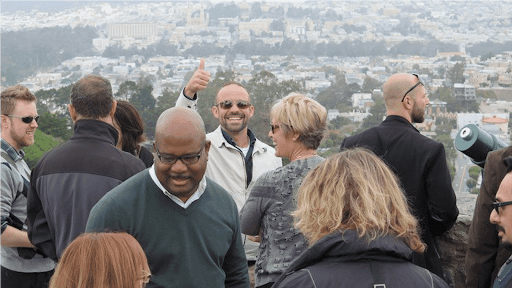No matter how skilled or experienced you are as a tour guide or tour director, the truth remains: you can’t always please everyone.
Some guests may arrive with personal frustrations, others may react to unexpected delays or cultural differences, and some may simply struggle to adapt to group travel dynamics. The important thing? Your response can make all the difference. In fact, some of your biggest wins as a tour leader will come from transforming an unhappy guest into one of your most loyal fans.
At ITMI, we emphasize this in our Group Psychology modules, What Would You Do scenarios, and optional real-world guest experience training, where you’ll gain practical exposure to the challenges of guiding actual groups—building your confidence from day one.
7 Essential Tips for Comforting and Connecting with Upset Tour Guests
Listen Without Interrupting
Active listening is your first line of defense. Guests want to feel heard and validated before any solution is offered. Resist the temptation to jump in and “fix” things right away. Instead, let them air their full grievance—even if you feel you know the outcome.
Pro Tip: Nodding and brief affirmations like “I understand” or “Tell me more” encourage full expression without cutting them off.
Stay Calm and Avoid Defensiveness
Feeling personally attacked when someone criticizes your efforts or itinerary is human nature. But as a tour professional, your role is to be a calm, stabilizing force. Detach your ego from the situation and focus on the guest’s experience, not your own feelings.
Remember: often the frustration is about a circumstance (a delay, a missed stop), not you as a person.
Personalize Your Response
Calling a guest by their name (Mr. Smith, Ms. Johnson, etc.) not only builds rapport but also reassures them that they are more than just a number in a group. Personal touches show sincerity and respect, two key ingredients in diffusing tension.
If you know any personal details they’ve shared earlier (e.g., celebrating an anniversary), weave that into your response to deepen the connection.
Acknowledge and Take Action Swiftly
Time is critical. Address concerns quickly to prevent resentment from growing. Even if you can’t solve the problem immediately (like a delayed flight), acknowledge their frustration and explain the next steps. This alone can reduce anxiety and help them feel supported.
Example: “I completely understand how frustrating this is, John. I’m already in contact with the hotel to confirm your early check-in, and I’ll update you within the hour.”
Keep the Whole Group in Mind
An upset guest’s mood can impact the whole group’s energy. Without breaching privacy, maintain positivity with your wider group and keep the momentum of the tour strong while you work on resolution in the background.
Check in privately with the upset guest later in the day to ensure they feel better.
Build Long-Term Trust (Even After a Conflict)
Not every situation will end in a perfect resolution. However, how you handle the aftermath matters just as much. Continue to offer the same level of care and attention to guests who’ve raised issues. This shows maturity and professionalism, leaving them with a positive final impression.
A follow-up message after the tour, thanking them for their participation, can rebuild bridges and encourage them to book with you again.
Leverage ITMI’s Hands-On Training
Through ITMI’s What Would You Do? Open Mic, live peer coaching, and optional real-world guest experience labs, our students master handling difficult conversations, cultural nuances, emotional intelligence, and proactive service recovery techniques. We also teach modern tools such as de-escalation strategies, empathy-first customer care, and trauma-informed communication—equipping graduates for every scenario, from mild complaints to high-stakes challenges.
New in our curriculum: Optional real-world guest experience practicums provide opportunities to apply what you’ve learned in authentic settings, helping you strengthen your skills and confidence under experienced instructors’ mentorship.
Tour Directing Is About More Than Logistics
It’s about emotional leadership. Handling challenging guests with patience, kindness, and confidence elevates your skills from good to exceptional. The best tour directors aren’t just logistical masterminds but community builders and problem solvers.
Looking to deepen your confidence in guest relations? Join ITMI’s immersive training program to sharpen your skills in real-world scenarios. We’re here to help you succeed, one guest interaction at a time.

